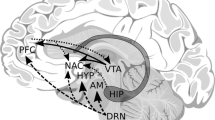Abstract
In our prior study we observed a significant association between homozygosity for the ≥5 alleles of a microsatellite polymorphism of cannabinoid receptor gene (CNR1) and drug dependence. Decreased amplitude of the P300 wave of evoked related potentials (ERP) has long been shown to be associated with alcohol and drug dependence. The P300 wave reflects attentional resource allocation and active working memory. Since marijuana intoxication has a potent blocking effect on short-term memory we examined the association between the CNR1 alleles and the P300 wave amplitude at three electrodes in 35 alcohol and drug addicts, by MANOVA. There was a significant decrease in amplitude of the P300 wave for all three electrodes (P = 0.028) that was most marked for the frontal lobes (P = 0.008) in subjects homozygous for the CNR1 ≥5 repeat alleles. Multivariate regression analysis indicated the CNR1 gene contributed to 20% of the variance of the frontal lobe P300 wave amplitude.
Similar content being viewed by others
Author information
Authors and Affiliations
Rights and permissions
About this article
Cite this article
Johnson, J., Muhleman, D., MacMurray, J. et al. Association between the cannabinoid receptor gene (CNR1) and the P300 event-related potential. Mol Psychiatry 2, 169–171 (1997). https://doi.org/10.1038/sj.mp.4000246
Accepted:
Issue Date:
DOI: https://doi.org/10.1038/sj.mp.4000246
- Springer Nature Limited
Keywords
This article is cited by
-
Plasma growth hormones, P300 event-related potential and test of variables of attention (TOVA) are important neuroendocrinological predictors of early cognitive decline in a clinical setting: Evidence supported by structural equation modeling (SEM) parameter estimates
AGE (2007)
-
(AAT)n repeat in the cannabinoid receptor gene, CNR1: association with schizophrenia in a Spanish population
European Archives of Psychiatry and Clinical Neuroscience (2006)
-
Human cannabinoid receptor 1: 5′ exons, candidate regulatory regions, polymorphisms, haplotypes and association with polysubstance abuse
Molecular Psychiatry (2004)




